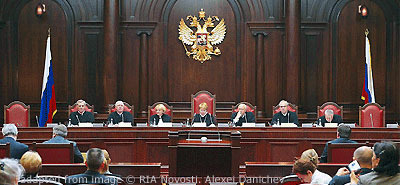Russian law on NGOs as “foreign agents” ruled constitutional

(Interfax – April 8, 2014) The Russian Constitutional Court has ruled that the controversial law that requires all non-government organizations to register as “foreign agents” if they receive funding from abroad and are involved in political activities is constitutional. However, the court said that the provision that lists fines for violating the law is unconstitutional because it says that the fine cannot be lower than a minimum amount, privately-owned Russian news agency Interfax reported on 8 April.
The court also ruled that criticism of the authorities alone cannot be considered as grounds to state that the NGO in question is involved in political activities. “To classify a non-commercial organization’s activities as political, they must be aimed at influencing state policy or shaping relevant public opinion. In the absence of such objectives, even if the organization criticizes the authorities or creates feelings of opposition among the public, it cannot be considered to be performing the function of a foreign agent,” Interfax quoted the court as saying.
Russian human rights activists criticized the ruling. Moscow Helsinki Group head Lyudmila Alekseyeva described it as “absurd”. “This decision is not only unfair, it is absurd, because the complainants’ arguments were based on the Russian constitution, which the Constitutional Court’s decisions should be based too. The decision that this law is not contrary to the constitution shows that we not only do not have courts of general jurisdiction, but we also do not have a constitutional court any more,” Alekseyeva said on Gazprom-owned, editorially independent Ekho Moskvy radio.
Grigoriy Melkonyants, co-chairman of the association for the protection of the rights of voters, Golos, said that the Constitutional Court’s decision would launch another round of inspections and sanctions against NGOs. “I predict that this decision of the Constitutional Court will give our bureaucratic machine a free hand in continuing repression of NGOs… The Constitutional Court chose the worst option for non-commercial organizations, falling short of even the minimum expectations they had,” Melkonyants told Interfax. In this situation, the European Court of Human Rights remains the only hope for NGOs, he added.
The chairman of the interregional human rights organization Agora, Pavel Chikov, also criticized the ruling, describing it as “especially funny against the background of Vladimir Putin’s speech yesterday with a report on foreign agents and spies identified last year”. However, Chikov noted the importance of the court’s definition of political activities.
